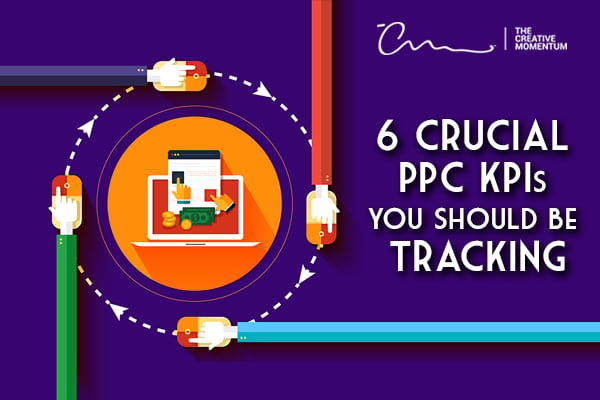
Running pay-per-click (PPC) ads without tracking key performance indicators (KPIs) is like going on a diet without weighing yourself. You’re putting in all this effort, but how do you know it’s working!?
Tracking PPC KPIs is like stepping on the scale. It’s a way to track your PPC ad performance to make sure the ads are effective. According to research, 97% of Google Ad campaigns fail without proper analytics.
Despite the importance of monitoring performance, 72% of companies haven’t even looked at their PPC campaigns in over a month! If you’re a part of that 72%, it’s time to take a deeper look. Here are six crucial PPC KPIs to track.
1. Number of Clicks
The first step to any conversion is a single click. That’s why the number of clicks your ad receives is one of the most important PPC KPIs to track.
Clicks are a great early indicator of campaign success. If tons of people click your ad, at least you know the messaging is resonating and working to drive traffic to your page.
While clicks are a powerful KPI, it shouldn’t be the only KPI you track. In the end, the goal is conversions for most businesses, unless your goal is simply brand awareness and authority. A click doesn’t always mean the customer made it to the end of the buyer’s journey. That’s why you should track several KPIs to truly understand your PPC campaign’s performance.
2. Average Click-Through Rate (CTR)
 Click-through rate (CTR) is another key performance indicator to judge PPC campaign performance. Instead of just paying attention to the number of clicks, CTR measures the total number of clicks against how many people see your ad.
Click-through rate (CTR) is another key performance indicator to judge PPC campaign performance. Instead of just paying attention to the number of clicks, CTR measures the total number of clicks against how many people see your ad.
You can measure CTR by taking the number of clicks and dividing it by the total impressions (people who saw your ad whether they clicked or not). For example, if you got 2,000 impressions and 200 clicks, your CTR would be 10%. The click-through rate is helpful because it adds context to the number of clicks.
There’s no “perfect” click-through rate, but there are resources with suggested benchmarks. They vary based on industry and other variables. For example, the travel industry has an average CTR of 4.68%, while technology ads level out around 2.09%.
Keep an eye on your average CTR over time. Make regular improvements to your ads and see if you can raise your CTR. The higher, the better!
3. Google Quality Score

Google Quality Score is a KPI that measures how “good” your ad is. Here is how Google defines a quality ad:
- Expected click-through rate
- Ad relevance
- Landing page experience
The better experience you give users, the higher your Google Quality Score.
Google Quality Score rates ads on a scale of ten, with one being the lowest and ten the highest. Google rewards high-quality ads (anything 7/10 or above) with discounts on your PPC campaigns. If you have a low Quality Score (6/10 or below), you’ll pay more.
Beyond the price savings, Google Quality Score is a good KPI to track because it ensures that your ads perform their best. If Google says you’re doing a good job, you can take that to the bank! Focus on CTR, user experience, and ad relevance to get your Google Quality Score as high as possible.
4. Cost Per Click (CPC)

Your cost per click will change depending on several factors, including keyword popularity, your Google Quality Score, and bid competition.
5. Conversion Rate (CVR)
If there were a “most important” PPC KPI to track, it would be conversion rate. Conversion rate (CVR) is the entire reason you run paid search ads. It’s the number of people who saw your ad, clicked on it, followed your call to action (CTA), and converted to a sale. Conversion rate is the measure of campaign success.
You can calculate CVR by dividing the number of conversions you received from a campaign by the total number of clicks. For example, if you got 200 clicks and 10 conversions, your CVR would be 10/200 or 5%.
Now, you might be wondering, if CVR is the most important KPI to track, then why bother with all the others? That’s because CVR is influenced by dozens of factors. From keywords and ad copy to landing page design and CTA, every tiny aspect of your PPC campaign can impact your conversion rates. Tracking other KPIs gives you a more precise idea of where you need to make adjustments to improve your conversion rates.
6. Cost Per Acquisition (CPA)
Cost per acquisition (also called cost per conversion) is another budget-tracking KPI. But instead of tracking the cost per click, it measures how much it costs to acquire a new customer and make a sale.
You can calculate CPA by dividing the total cost of the campaign by the number of conversions generated.
Cost per acquisition is a helpful KPI to help you manage costs. For example, if your profit margin on a product is 10% and your CPA is 15% of your product’s price, it’s not cost-effective to maintain that campaign. You either need to reduce your cost per acquisition or pause the campaign.
Maximize Your PPC Potential
Paid search ads aren’t meant to go live and be forgotten. If you aren't checking their performance regularly, you're wasting money on your PPC campaigns. Keep a close eye on these crucial PPC KPIs to understand how your ads are performing, where to make improvements, and how to get more bang out of your marketing buck!
If you’re ready to maximize your PPC potential, work with a team that understands what it takes to create winning ad campaigns. We're always happy to manage and track your PPC ads to make sure you’re getting the online attention your business deserves. Contact us for a free consultation!


